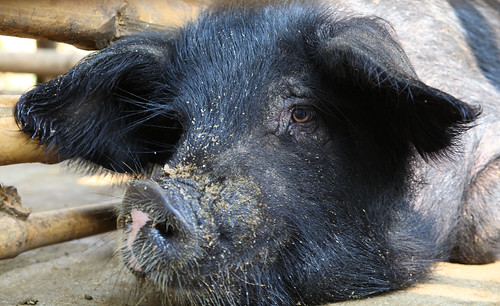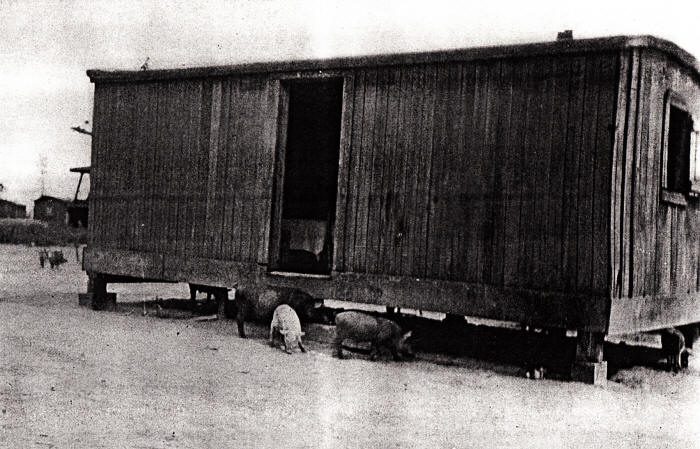
From Charles Dickens Notes on America, Chapter 6: Let us go forth again into the cheerful streets.
Once more in Broadway! Here are the same ladies in bright colours, walking to and fro, in pairs and singly; yonder the very same light blue parasol which passed and repassed the hotel-window twenty times while we were sitting there. We are going to cross here. Take care of the pigs. Two portly sows are trotting up behind this carriage, and a select party of half-a-dozen gentlemen hogs have just now turned the corner.

Here is a solitary swine lounging homeward by himself. He has only one ear; having parted with the other to vagrant-dogs in the course of his city rambles. But he gets on very well without it; and leads a roving, gentlemanly, vagabond kind of life, somewhat answering to that of our club-men at home. He leaves his lodgings every morning at a certain hour, throws himself upon the town, gets through his day in some manner quite satisfactory to himself, and regularly appears at the door of his own house again at night, like the mysterious master of Gil Blas.

He is a free-and-easy, careless, indifferent kind of pig, having a very large acquaintance among other pigs of the same character, whom he rather knows by sight than conversation, as he seldom troubles himself to stop and exchange civilities, but goes grunting down the kennel, turning up the news and small-talk of the city in the shape of cabbage-stalks and offal, and bearing no tails but his own: which is a very short one, for his old enemies, the dogs, have been at that too, and have left him hardly enough to swear by.

He is in every respect a republican pig, going wherever he pleases, and mingling with the best society, on an equal, if not superior footing, for every one makes way when he appears, and the haughtiest give him the wall, if he prefer it. He is a great philosopher, and seldom moved, unless by the dogs before mentioned. Sometimes, indeed, you may see his small eye twinkling on a slaughtered friend, whose carcase garnishes a butcher’s door-post, but he grunts out ‘Such is life: all flesh is pork!’ buries his nose in the mire again, and waddles down the gutter: comforting himself with the reflection that there is one snout the less to anticipate stray cabbage-stalks, at any rate.

They are the city scavengers, these pigs. Ugly brutes they are; having, for the most part, scanty brown backs, like the lids of old horsehair trunks: spotted with unwholesome black blotches. They have long, gaunt legs, too, and such peaked snouts, that if one of them could be persuaded to sit for his profile, nobody would recognise it for a pig’s likeness. They are never attended upon, or fed, or driven, or caught, but are thrown upon their own resources in early life, and become preternaturally knowing in consequence.

Every pig knows where he lives, much better than anybody could tell him. At this hour, just as evening is closing in, you will see them roaming towards bed by scores, eating their way to the last. Occasionally, some youth among them who has over-eaten himself, or has been worried by dogs, trots shrinkingly homeward, like a prodigal son: but this is a rare case: perfect self-possession and self-reliance, and immovable composure, being their foremost attributes.

The streets and shops are lighted now; and as the eye travels down the long thoroughfare, dotted with bright jets of gas, it is reminded of Oxford Street, or Piccadilly. Here and there a flight of broad stone cellar-steps appears, and a painted lamp directs you to the Bowling Saloon, or Ten-Pin alley; Ten-Pins being a game of mingled chance and skill, invented when the legislature passed an act forbidding Nine-Pins.

At other downward flights of steps, are other lamps, marking the whereabouts of oyster-cellars — pleasant retreats, say I: not only by reason of their wonderful cookery of oysters, pretty nigh as large as cheese-plates (or for thy dear sake, heartiest of Greek Professors!), but because of all kinds of caters of fish, or flesh, or fowl, in these latitudes, the swallowers of oysters alone are not gregarious; but subduing themselves, as it were, to the nature of what they work in, and copying the coyness of the thing they eat, do sit apart in curtained boxes, and consort by twos, not by two hundreds. (source: Charles Dickens Notes on America, Chapter 6)

Inventory management systems contribute to security by tracking stock levels and movements. Barcode scanners and RFID technology reduce discrepancies and detect losses early. These systems help retailers pinpoint theft sources and emergency security improve operational efficiency. When integrated with security protocols, inventory management ensures that products are accurately accounted for and protected from internal or external theft.
ReplyDelete